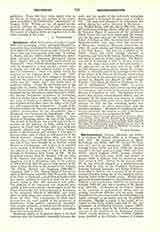

Reichensberger, AUGUST, politician and author, b. at Coblenz, March 22, 1808; d. at Cologne, July 16, 1895. He studied jurisprudence at Bonn, Heidelberg, and Berlin (1827-30), entered the Prussian civil service as auscultator (1830), travelled through France (1833) and Italy (1839-40), became counsel in the land court at Cologne (1841) and Trier (1844), visited England (1846), became chamber-president in the land court (1848) and counsel of appeal (1849) at Cologne until his retirement from civil service in 1875. Except for the interval 1863-70, he was actively engaged as a parliamentarian from 1848 to 1885, in the Frankfort Parliament, Prussian National Assembly, and Erfurt Volkshaus. From 1851 to 1863 he was a member of the Prussian Second Chamber, being one of the founders and influential leader of the Catholic party. Elected delegate to the Second Chamber for three districts, he chose Coblenz as his constituency (1870-3); he represented Cologne (1879-85) and was a member of the Reichstag (1871-84). Co-founder of the Center, tireless in his attention to parliamentary duties, and exercising a beneficent influence over his party, though Windthorst was the actual leader, Reichensberger was highly esteemed as an orator even by his political opponents. Though a sceptic in his youth, he returned to the Faith deeply impressed by the imprisonment of Archbishop Clemens August (1837). He took an active share in the Catholic movement, was one of the founders of the Borromicus Society (1848), keenly interested in the budding Catholic press, presided at the Catholic Congress of Cologne (1858), and championed religious freedom at numerous other gatherings.
He was an outspoken friend of art and praised Gothic in his writings. He was “not a real historian or archaeologist, nor a philosopher in the domain of art, but chiefly a practical apostle for the revival of a pure, German art incorporating Christian ideas” (Pastor). Until the end of his life he promoted the completion of the Cologne Cathedral, by word and pen, and founded (1841) at Coblenz the first Dombauverein (cathedral building society). The fresh, cheerful, amiable, and kindly personality of this versatile man exercised a powerful influence. Opposed to extreme theories, he maintained a temperate attitude in both secular and ecclesiastical politics. A list of his numerous literary productions covers twenty-five printed pages (Pastor, II, 449), and contains mainly occasional writings which appeared in newspapers and magazines. Most of his separately published works were concerned with art, history, and criticism: “Christliche germanische Baukunst” (1845); “Fingerzeige auf dem Gebiete der kirchlichen Kunst” (1854); “Vermischte Schriften fiber kirchliche Kunst” (1856); “Eine kurze Rede and eine lange Vorrede fiber kunst” (1863); works on Merian, G. G. Ungewitter, Pugin, etc. Of importance also were his political writings, “Die Wahlen zum Hause der Abgeordneten” (1858) the often reprinted “Biichlein Phrasen and Schlagworter” (1862), etc., and his “Essay fiber Shakespere” (1871). His juridical studies are most poorly represented.
HERMANN CARDAUNS

